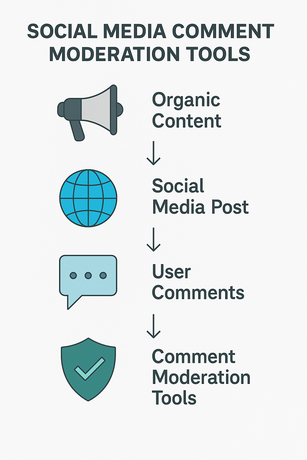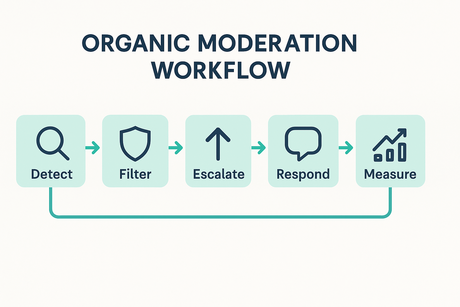January 16, 2026
A clear operator-first escalation ladder for knowing exactly when to involve support, legal, or leadership on Instagram.
Aug 29, 2025
11 min
Master organic community care in 2025. Discover the best social media comment moderation tools to remove spam, build trust, and turn engagement into conversions with customizable workflows.

Organic social media was once thought of as “earned” space. A channel where customers could engage openly, brands could post without spending, and community felt raw and unfiltered. But in 2025, that assumption has changed.
Your brand’s comment section is no longer just conversation — it’s reputation, sales pipeline, and customer support desk rolled into one. Unmoderated spaces quickly fill with spam, trolls, misinformation, and missed sales opportunities. Done right, moderation preserves authenticity while protecting your brand. Done poorly, it erodes trust and leaves revenue on the table.
That’s why social media comment moderation tools have become essential for ecommerce brands. Native filters aren’t enough, and generic AI solutions lack nuance. This guide explores why organic moderation matters, what tools can do, and how solutions like Superpower are redefining the space with customizable rules.
Your organic channels represent your brand’s “front door.” If the first thing potential customers see under your Instagram post is spam links, aggressive trolls, or misinformation about your product, they may walk away before even visiting your store.
A surprising number of organic comments are sales-qualified leads in disguise: “Does this ship to the UK?” “Is there a vegan option?” “When does the sale end?” Leaving these unanswered is like leaving money on the table.
(Related read: How to Handle Spam Comments on Facebook Ads (and Protect ROAS))
Some brands worry that moderation risks silencing customers. But the opposite is true. Moderation ensures real voices rise above the noise. Trolls, bots, and spammers don’t deserve equal space in your community. Customers do.

The baseline: catching obvious spam links, phishing attempts, and bot-like comments that damage credibility.
The advanced tier: highlighting comments that indicate buying intent. Tools should separate noise from potential customers, so your team can prioritize the right replies.
Modern tools aggregate comments from Instagram, TikTok, Facebook, and YouTube into one hub. This makes it easier for teams to monitor volume at scale and build processes around engagement.
Facebook or Instagram’s built-in moderation is primitive: you add banned words to a list, and those comments get hidden. But language is nuanced. For example:
Your brand has a specific tone. Some criticism you want to leave visible, others you want to engage with, and some you must remove instantly. Native tools can’t distinguish intent.
Moderating Facebook, Instagram, TikTok, and YouTube separately is time-intensive. Native tools don’t give a unified view or automation.
(Related read: How to Increase ROAS with AI)
Delays in moderation let trolls and spam take root. Look for tools that hide problematic comments instantly.
Generic AI tools rely on broad positive/neutral/negative buckets. That’s rarely useful. You need custom rules that reflect your actual brand guidelines.
When someone asks “Does this come in XL?” that should be escalated immediately.
The best tools don’t just moderate — they help you learn from comments. What’s driving negative sentiment? What questions keep coming up?
Not all negative comments are created equal. “Too expensive” is subjective but valid. “Scam” is brand-damaging and often false. “Shipping?” is a sales opportunity. Custom rules let you treat each differently.
Most tools group comments into buckets — but sentiment is blunt. A sarcastic “great job” might be negative, while “expensive” could be positive.
Superpower stands out by letting brands create their own instruction sets. Instead of defaulting to “hide negative,” you can decide:
(Related read: Jobber’s Meta Strategy Audit)
Engaged, healthy comment threads often get prioritized in feeds. Meta’s ranking signals reward active, safe engagement.
When people see your brand protecting the space, they’re more willing to engage and advocate.
A delayed response to a question is often a lost sale. Brands that respond in near real-time convert more organic curiosity into revenue.
Decide what’s unacceptable (spam, profanity), what’s debatable (pricing), and what’s valuable (UGC, intent).
Codify your rules inside Superpower to instantly filter noise while surfacing what matters.
Who answers shipping? Who thanks fans? Assign clear responsibilities.
Comments evolve with campaigns. Update your rules as your community grows.

Organic social media is the most public community your brand owns. In 2025, leaving it unmoderated is a liability. Spam, trolls, and misinformation weaken trust. Buyer questions slip through the cracks. Constructive criticism can spiral into unchecked negativity.
But moderation isn’t censorship — it’s community care. The right tool empowers your brand to silence noise, elevate customer voices, and convert intent. Native tools can’t deliver this nuance. Generic AI filters don’t either.
That’s why customizable, brand-specific solutions like Superpower are so important. With rule-based instructions, real-time filtering, and cross-platform monitoring, Superpower turns moderation into a growth lever.
If your brand invests in organic social, don’t treat comment moderation as optional. Treat it as a trust and conversion strategy.
Check out Dang! For more tools below:
1. What are social media comment moderation tools?
They are platforms that filter, manage, and escalate comments to protect brand trust and engagement.
2. Why does organic need moderation if paid is already managed?
Because trust and conversions often start in organic — and trolls, spam, or silence can derail it.
3. How is Superpower different?
Unlike generic AI, Superpower uses customizable rules, letting you define how to treat nuanced comments.
4. Can moderation really improve sales conversions?
Yes. Buyer questions answered quickly often lead to purchases. Moderation surfaces these opportunities.
5. What’s the best way for a small team to start?
Define rules, automate them in Superpower, and dedicate just 30 minutes daily to monitoring.

Explore expert tips, industry trends, and actionable strategies to help you grow, and succeed. Stay informed with our latest updates.